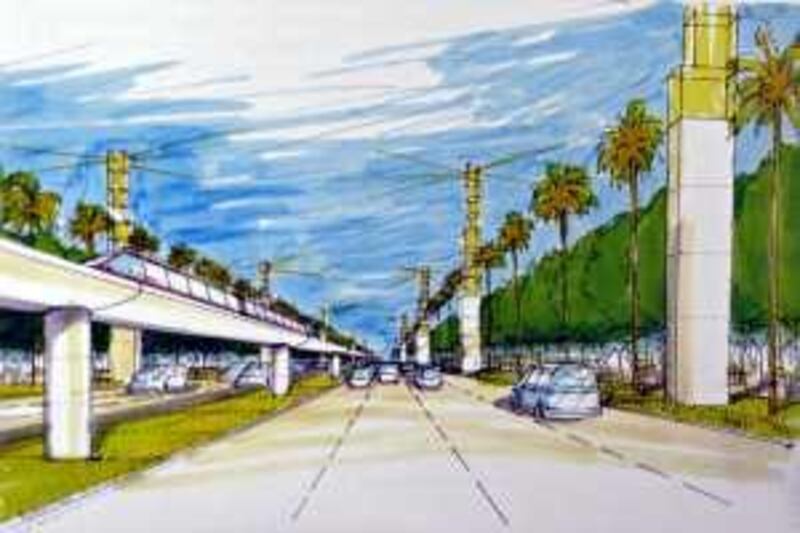ABU DHABI // Trams will start operating in the capital by 2014, with the metro opening two years later, the Department of Transport's chairman said yesterday. Abdulla al Otaiba stressed that the city's major transport projects were going ahead in spite of the global financial downturn. "The tram will be starting operation in 2014," he said. "Metro, 2016." Mr al Otaiba was speaking at a conference on sustainable urban transport at the Shangri-La Hotel. Hosted by his department and the International Association of Public Transport, the event brought together transportation planners and firms from around the world.
Much of the focus was on the capital, as Mr al Otaiba opened the conference sessions then signed the association's Charter on Sustainable Development, a voluntary agreement by the department to track, measure and report its performance in this sphere. "Our goal is to implement transport solutions that produce less emissions, and that will eventually move towards cleaner and greener sources of energy," he said.
The opening dates come a week after the department invited consultancies to bid for the right to prepare a feasibility study for the 131 kilometre metro project. The contract is to be awarded in the third quarter of this year and the study completed over 18 months. The department has also announced it will have 1,360 buses operating on an integrated network around the emirate by the end of next year.
Last month it shortlisted five consortia to bid for a Dh10 billion (US$2.7bn) contract to upgrade the 327km highway between Abu Dhabi and the Saudi border, a move officials said signalled that transport projects were being given the green light. The masterplan is expected to be revealed to the public next month, including details of the network's routes. It is also expected to include a regional railway to Dubai and water taxis.
A preliminary map released by the Government last year shows an integrated transit network featuring the metro with stations on Abu Dhabi island, connecting to the Musaffah industrial zone, the planned Capital City and Masdar, Abu Dhabi International Airport and Saadiyat and Yas Islands. A street-level tram system is shown making frequent stops in busy downtown sectors, with lines also running in Al Raha Beach, Musaffah, to the airport and to Reem, Saadiyat and Yas islands.
Without an improved mass transit infrastructure, the department predicts the road network will reach capacity before 2020. The flow of vehicles to Abu Dhabi island may increase to 100,000 an hour by then, it forecasts, from about 15,000 an hour today. Mr al Otaiba said he did not expect there to be difficulty finding investors for the projects and added that the Government would seek to form more private-public partnerships.
"It is one of the top priorities of the Government to go ahead and implement transportation," he said. "We expect that the investors will be keen to invest in these projects." Hans Rat, secretary-general of the International Association of Public Transport, congratulated the department for its comprehensive plan but said the challenge for it, and other Middle East nations looking to promote mass transit, would be to "create a society far less dependent on the use of the private car. Countries far less dependent on private cars are more wealthy than those who are," he said.
Abu Dhabi's plans come as Dubai is preparing to open the first line of its metro system in September. During today's conference session, department officials are to lead sessions on the surface transportation masterplan. A speaker from the taxi regulator, TransAD, will discuss the emirate's plans for upgrading the existing taxi service. mchung@thenational.ae






